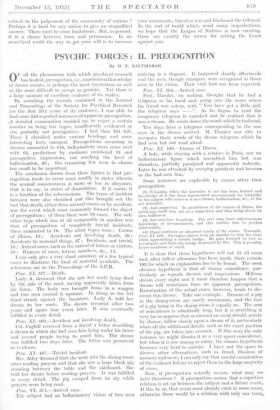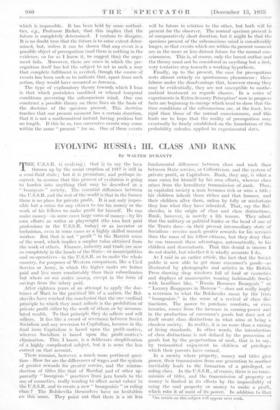PSYCHIC FORCES : H. PRECOGNITION
By H. 'F. SALTMARSH
y all the , phenomena with which psychical research
O
has to Klealiprecognition, i.e., supernormal knowledge of future events, is perhaps the most mysterious as well us the most ;difficult to accept as genuine.. Yet there is a large amount of excellent evidence of its reality.
By searching the records contained in the , Journal and Proceedings of the Society for Psychical Research . for the, first fifty years of its existence, I ,was able to find some.849 reported instances of apparent precognition. A detailed examination enabled me to reject a certain number .as. being too vague, insufficiently evidenced or else probably not precognitive. I had then 281 left. These I classified under various headings and some interesting facts emerged. Precognitions ,occurring in dreams amounted to 116, hallucinatory eases came next with 62, predictions by mediums numbered 5.1 and precognitive impressions, not reaching the level of hallucination, 89 ; the remaining few were in classes too small to be important. The conclusion drawn from these figures is that pre- cognition tends to occur most readily in states wherein the normal consciousness is more or less- in abeyance, that is to say, in states of dissociation. If it exists, it is a function of the subconscious. The types of incident foreseen were also classified and this brought out the fact that death, either from natural causes or by accident, was the event which most commonly formed the object of precognition ; of these there were 99 cases. The only other type which was at all comparable in number was that of precognition of completely trivial incidents, these amounted to 70. The other types were : Course of illness, 18 ; Accidents not involving death, 20 ; Accidents to material things, 87 ; Incidents, not trivial, 12 ; Arrival cases, such as the arrival of letters or visitors, 18.; Winners of races, lottery numbers, &c., 15.
I can only give a very short summary of a few typical eases to illustrate the kind of material available. The references are to the Proceedings of the S.P.R.
Proc. XI., 577.—Death. Lady, A. dreamed that she saw her uncle lying dead by the side of the road, having apparently fallen from his horse. The body was brought home in a waggon rind two men carried it upstairs. In doing so the left 'mild struck against • the banisters. Lady A. told her dream ; to her uncle. The, dream recurred after two years and again four years later. It was eventually fulfilled in every detail.
Proc. XI. 489.—Accident not involving death. Col. Coghill received from a friend a letter describing a dream in which she had seen him lying under his horse and peveral people trying to assist him. The dream was fulfilled two days later. The letter was preserved as evidence.
Proc. XI. 487.—Trivial incident.
Mrs. Atley dreamed that she went into the dining-room after reading prayers and that she saw a large black pig standing between the table and the sideboard. She told her dream before reading prayers. It was fulfilled in every detail. The pig escaped from its sty while prayers were being read.
Proc. VI. 874.—Arrival case.
The subject had an hallucinatory vision of two men Arriving in a dogcart. It, happened shortly afterwards and the men, though strangers; were recognised as those seen in the. vision. . Their visit had not been expected.
Proc. XI. 503.—Arrival case: • • Prof. Thoulet, on waking., thought that he had a telegram in his hand and, going.. into the room where this friend, was asleep, said, " You have got a little girl, the telegram says —". As he began. to read :the imaginary telegram it vanished and he realised that it was a dream. He wrote down the words which he had read. . • Ten days later a telegram corresponding to the one seen in the dream arrived. M. Thoulet was able to recognise those words of the dream telegram which he had seen but not read aloud.
Proc. XI. 44G.—Course of Illness.
A lady,' while staying with a relative in Paris, saw an hallucinatory figure which resembled him but was Shrunken, partially paralysed and apparently imbecile. Later he was attacked by creeping paralysis and became as the had seen him.' • Some instances are explicable by causes other than precognition.
(1) Telepathy, when the intention to act has boon formed and knowledge of it has been transmitted unconsciously by telepathy to the subjeot who receives it as a dream, hallucination, &c., of the act intended.
(2) Auto•suggestion. In predictions of the course of illness, the prediction itself may act as a suggestion and thus bring about ite own fulfilment.
(3) Sub-conscious knowledge. The seer may have ,sub-conscious knowledge of circumstances, and this enables him to predict inferentially.
(4) Hyper-aesthesia or abnormal acuity of the 8C11.4C8. Example. Proc.. XI. 419. An engine driver feels an impulse to stop his train when approaching a trestle bridge. Ho goes forward on foot to investigate and finds the bridge destroyed by fire. This is possibly hyper-aesthesia of smell.
• It is clear that these hypotheses will not fit all cases and, after fullest allowance has been made, there remain 188 for which an explanation has to be found. The most obvious hypothesis is 'that of chance • coincidence, par- ticularly as regards dreams and impressions. Millions dream every night and it must therefore happen that a dream will sometimes form an apparent precognition. Examination of the actual cases, however, tends to dis- count this theory. Take one example. Dreams of a pig in the dining-room are surely uncommon, and the fact of a pig being In the dining-room is equally so. The arm of coincidence is admittedly long, but it is stretching it very far to suppose that so unusual an event should, purely by chance, follow closely upon a dream of it, particularly when all the additional details, such as the exact position of the pig, are taken into account. If this were the only instance we might dismiss it as a very queer coincidence, but when it is one among so many, the chance hypothesis becomes very hard to sustain. I have not the space to discuss other alternatives, such as fraud, illusions Of memory and so on, I can only say that careful examination of the evidence led me to reject them in the large majority of eases.
Now, if precognition actually occurs, what may we infer therefrom ? A precognition means that a cognitive relation is set up between the subject and a future event. If this be so, that event must already exist in some sense, otherwise there would be a relation with only one term„ . which is impossible. It has been held by sonic authori- ties, e.g:, Professor Richet, that this implies that the future is completely ,determined. I venture to dkagree. It is no doubt true that the future is to some extent deter- mined, but, unless it can be shown that. any event is a possible object of precognition (and there is nothing in the evidence, ko far as I know it, to suggest this) the argu- ment fails. Moreover, there are cases in which the pre- cognition itself has led the subject to act in such.. a, way that complete fulfilment is averted, though the course of events has been such as to indicate that, apart from such action, they would have occurred as foreseen. • The type of explanatory theory towards which I lean is that which postulates modified or relaxed temporal conditions governing the subconscious mind. .One can construct a possible theory on these lines en the basis of the, doctrine of the specious present. This doctrine teaches that our present moment has a certain duration, that it is not a mathematical instant having position but no length. If this be so, two successive events may come within the same " present " for us. One of these events will be future in relation to the other, but .both Will be present for the' observer. The normal specious present is of comparatively short duration, but it might. be that the specious present of the subconscious mind is considerably longer, so that events which are within its present moment are in the more or less distant future for the normal con- sciousness. This is, of course, only the barest outline and the theory must not be considered as anything but a first, very tentative step towards a -working hypothesis. Finally, up to the present, the case for precognition rests almost entirely on spontaneous phenomena ;. these labour under the disadvantage that, however strong they may be evidentially, they arc not susceptible to mathe- matical treatment as regards chance. In a series of experiments in Extra-Sensory Perception* now in progress facts are beginning to emerge which tend to show that the time conditions of the subconscious are, at the least, less rigid than those of the normal consciousness, and this leads me to hope that the reality of precognition may eventually be firmly established on the foundation of the probability calculus applied to experimental data.















































 Previous page
Previous page